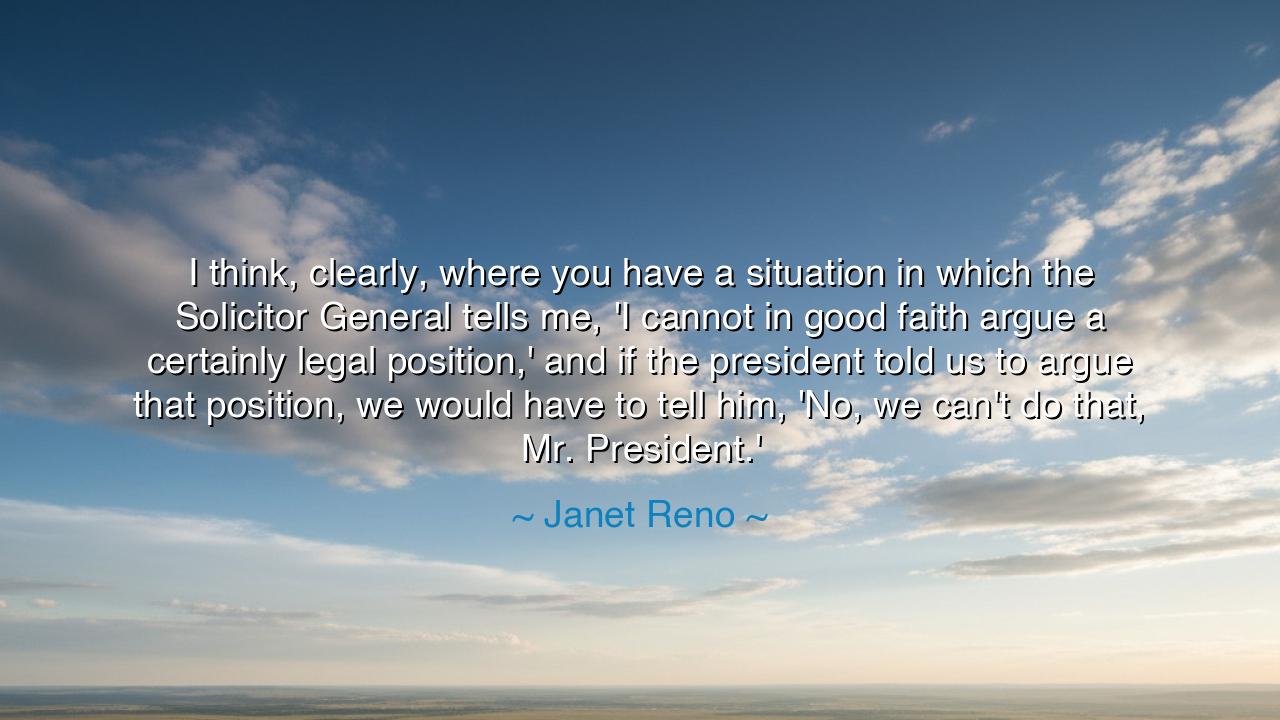
I think, clearly, where you have a situation in which the
I think, clearly, where you have a situation in which the Solicitor General tells me, 'I cannot in good faith argue a certainly legal position,' and if the president told us to argue that position, we would have to tell him, 'No, we can't do that, Mr. President.'






Hear the solemn words of Janet Reno, the first woman to serve as Attorney General of the United States, who bore the burden of law upon her shoulders: “I think, clearly, where you have a situation in which the Solicitor General tells me, ‘I cannot in good faith argue a certainly legal position,’ and if the president told us to argue that position, we would have to tell him, ‘No, we can’t do that, Mr. President.’” These are words of fire, for they declare that law is not the servant of power, but that power must kneel before the law.
When Reno speaks of the Solicitor General refusing to argue a case in “good faith,” she is calling attention to the sacred duty of the law: not merely to argue what is technically defensible, but to pursue what is just and true. For if the law is wielded without conscience, if it becomes only a tool to serve the will of rulers, then it ceases to be law at all and becomes only tyranny in disguise. In this moment, Reno declares that integrity is the guardian of justice, and without it, the entire structure of democracy crumbles.
The heart of her statement rests upon the phrase “No, we can’t do that, Mr. President.” Here lies the essence of the rule of law—that even the most powerful in the land must be told “no” when they step beyond the bounds of justice. To stand before the president and refuse is no small thing. It requires courage, humility, and unwavering loyalty not to a man, but to the Constitution and the people it protects. Reno’s words remind us that the true strength of a democracy is not found in obedience to leaders, but in fidelity to principle.
History offers a mighty example in the Saturday Night Massacre of 1973. During the Watergate scandal, President Richard Nixon sought to fire the special prosecutor investigating him. The Attorney General, Elliot Richardson, refused to carry out the order, choosing instead to resign rather than violate his duty. His deputy also resigned for the same reason, and only after several refusals was Nixon’s will finally obeyed. This moment shook the nation, yet it also proved the resilience of the republic: that there are times when the highest loyalty is to the law itself, even if it costs one’s office. Reno’s words walk in this same tradition.
The meaning of her statement, then, is both heroic and cautionary. Heroic, for it shows that public servants can and must resist when conscience and law demand it. Cautionary, for it warns that the temptation of leaders to bend the law to their own desires is ever-present, and only vigilance can prevent its corruption. Reno reminds us that good faith is the lifeblood of justice, and without it, the law becomes an empty shell, hollowed of truth.
This teaching carries forward to all people, not only the guardians of government. Integrity must guide every choice—whether in courtrooms, in workplaces, or in daily lives. To act “in good faith” is to honor truth even when it is inconvenient, to refuse dishonesty even when it could bring gain, to say “no” even when those in power demand “yes.” It is a lesson as old as civilization: without integrity, no society can endure.
Children of tomorrow, let this wisdom burn within you: when you are asked to betray conscience for convenience, when you are told to act against justice for the sake of power, be brave enough to say, “No, I can’t do that.” Stand firm even when the cost is high, for every act of integrity strengthens the pillars of freedom. In your daily lives, be faithful to truth, honest in your dealings, and courageous in your refusals, for these small acts of conscience weave the fabric of a just society.
Thus, Reno’s words endure as a guiding star: that the law is not a servant of rulers, but the shield of the people; that good faith is the measure of justice; and that courage is required to resist even the most powerful when they seek to misuse the law. Carry this teaching forward, for in it lies the protection of liberty for generations yet to come.






AAdministratorAdministrator
Welcome, honored guests. Please leave a comment, we will respond soon